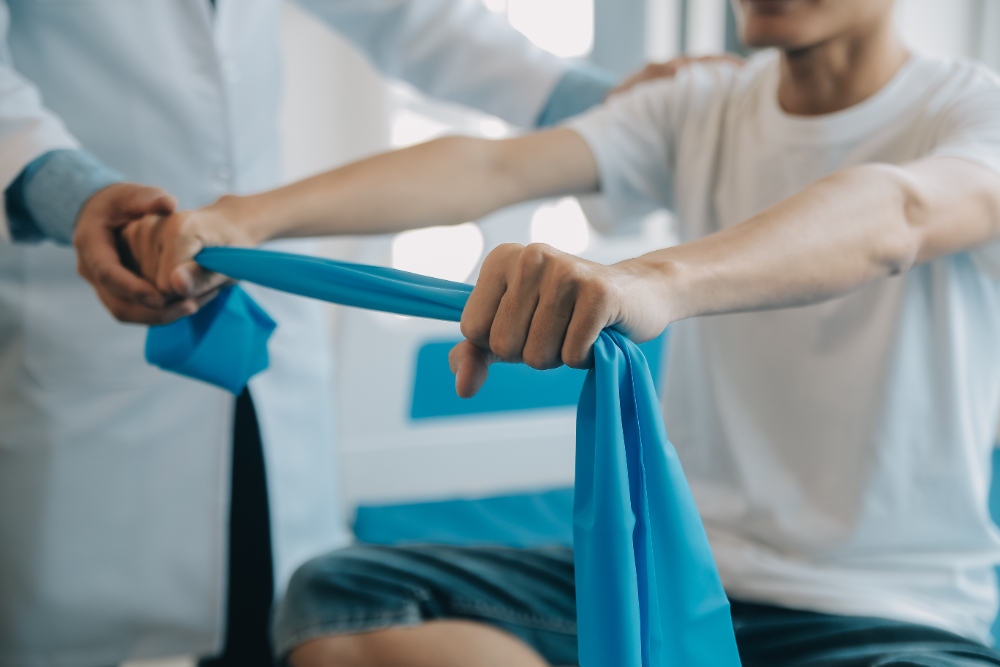Monitoring Strength in Physical Therapy: Why It Matters and How It’s Done

Strength is an essential component of health and recovery, particularly when it comes to physical therapy. Whether you’re overcoming an injury, managing chronic pain, or working toward peak physical function, monitoring your strength plays a vital role in your progress.
If you’re curious about the role strength monitoring plays in physical therapy and how it can support your recovery goals, this blog will guide you through the process.
And if you’re considering physical therapy in Lake Mary, FL, we’ll show you why having a trusted partner, like B Physical Therapy, can make all the difference.
Why Is Strength Monitoring Important in Physical Therapy?
Strength monitoring is more than just keeping track of how much weight you can lift or push. It’s an essential tool in physical therapy that ensures your rehabilitation or fitness plan is on the right track. Here’s why it matters.
1. Gauging Progress
Physical therapy is a multi-step process, often tailored to an individual’s unique condition. To know whether your body is responding positively to the prescribed exercises, strength measurements are regularly evaluated. Tracking this progress helps determine whether continued therapy is needed, or if adjustments to the plan are necessary.
For instance, if you’re recovering from a knee injury, a physical therapist will monitor the strength of the surrounding muscles to assess recovery and prevent potential weaknesses that could lead to further injury.
2. Preventing Overtraining
Pushing your body too hard during recovery could slow your progress rather than speed it up. Strength monitoring can help physical therapists set safe limits for each session, ensuring you steadily improve without risking overexertion.
For example, a patient with chronic lower back pain will need careful management of their exercise regimen to rebuild core strength without triggering flare-ups.
3. Providing Motivation
Seeing measurable improvements in strength can be incredibly motivating. Whether it’s being able to hold a longer plank, adjust resistance bands, or notice performance in a daily activity, such as climbing stairs, tangible results can keep you committed to your therapy routine.
Techniques and Tools Used to Monitor Strength in Physical Therapy
Physical therapists use a variety of tools and methods to assess and monitor strength effectively. These tools are not just about lifting weights but cater to your body’s unique needs.
Manual Muscle Testing (MMT)
Manual Muscle Testing is one of the most common methods used in physical therapy. During MMT, your therapist manually evaluates the strength of specific muscles by resisting your movement. This technique helps pinpoint weaknesses and ensures targeted exercises.
Functional Assessment Tools
Many physical therapists also use functional strength assessments, which simulate real-world activities. For example, they may ask you to perform a sit-to-stand motion or assess your ability to maintain balance during certain exercises. This allows them to tie strength gains directly to improved function in everyday life.
Dynamometers
Dynamometers are advanced tools designed to measure strength quantitatively. For instance, hand grip dynamometers are often used to assess overall strength, especially in older adults recovering from surgery.
Wearable Technology
With advancements in technology, physical therapists may incorporate wearable devices to collect strength and activity data. These tools allow for ongoing strength tracking and help ensure therapy programs continue to align with your goals.
Resistance Testing
Testing your ability to overcome specific ranges of resistance, such as through resistance bands or weighted machines, is a common approach. These tools not only measure strength but can also help tailor future sessions.
How Strength Monitoring Improves Outcomes in Physical Therapy
Custom-Tailored Exercise Plans
Strength monitoring allows therapists to design a program uniquely suited to you. For example, an athlete overcoming an ACL injury won’t follow the same plan as someone recovering from a hip replacement.
By continually assessing your muscle performance, expect a program that aligns with your goals, minimizes discomfort, and accelerates recovery.
Reducing Re-Injury Risks
Weak or imbalanced muscles often lead to further injuries. Monitoring strength ensures muscle groups recover evenly, preventing compensatory movements that can strain other parts of the body.
For instance, someone recovering from ankle surgery might unknowingly put extra pressure on their other leg, risking overuse issues. Strength monitoring helps catch and correct such imbalances early.
Building Confidence for Everyday Activities
Monitoring your progress shows that you’re closer to returning to your daily routine than you may think. From lifting a laundry basket pain-free to running a marathon again, these objective metrics serve as a bridge between recovery and empowerment.
Choosing the Right Physical Therapy Team
If you’ve been searching for physical therapy in Lake Mary, FL, it’s essential to choose a team that prioritizes your progress and health. At B Physical Therapy, we understand the importance of monitoring strength as part of a comprehensive recovery plan.
Strength isn’t just about the big lifts in the gym. It’s about being able to pick up your kids, run errands without pain, and perform at your best at work and in life. Our expert therapists use cutting-edge tools and personalized care plans to help you feel stronger every day.
How to Get Started
If you’re ready to regain strength and improve mobility, it’s time to take action. Contact B Physical Therapy today and schedule an appointment. We’re committed to helping you achieve your recovery and performance goals with expert care tailored to your unique needs.
Don’t wait to feel better. Reach out to the professionals who truly care about seeing you succeed.